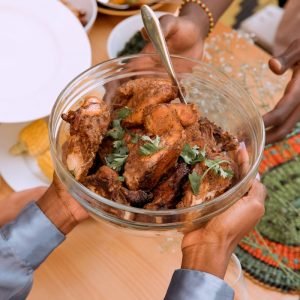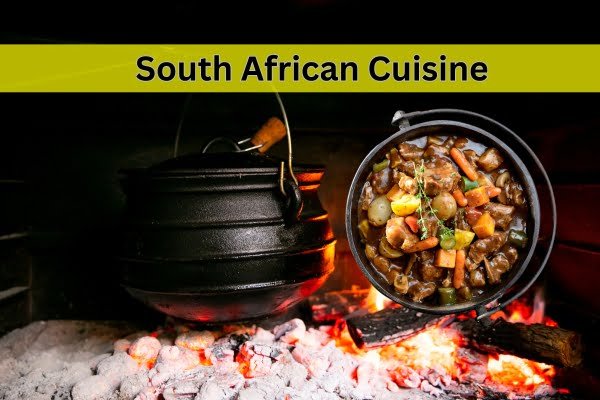Exploring the Rich and Diverse Cuisine
A Culinary Journey Through South Africa’s History
South African cuisine is a vibrant tapestry woven from the threads of its diverse cultural history.
The roots of this rich culinary heritage can be traced back to the indigenous peoples, whose traditional ingredients and cooking methods form the foundation of many South African dishes.
These indigenous cultures, including the Khoisan and Bantu-speaking people, utilized local resources such as maize, sorghum, and a variety of meats and vegetables, laying the groundwork for the country’s gastronomic identity.
The arrival of European settlers in the 17th century marked the beginning of significant shifts in South Africa’s food landscape. Dutch colonists brought with them a variety of cooking techniques and ingredients, including pickling and baking, which have become staples in South African cuisine.
The Dutch influence is particularly evident in dishes like bobotie, a spiced minced meat dish with a custard topping, and the beloved koeksisters, a deep-fried pastry soaked in syrup.
British colonization further enriched the culinary scene, introducing foods such as roast meats, puddings, and pies.
The British impact is also visible in the South African love for tea and the popularization of afternoon tea snacks, including scones and finger sandwiches.
Immigration from India and Malaysia introduced a new palette of spices and flavors, significantly transforming South African cooking.
Indian laborers brought with them a rich tradition of curries and spices, which have been seamlessly integrated into the local cuisine. This fusion is best exemplified by dishes like bunny chow, a hollowed-out loaf of bread filled with curry, and the aromatic Cape Malay curry, which combines sweet and savory elements.
Key historical events, such as the establishment of Cape Town as a trading post, played a crucial role in the introduction of diverse culinary influences.
The spice trade, in particular, brought an influx of new ingredients and cooking methods, further diversifying the South African food landscape.
Today, South African cuisine stands as a testament to its complex history, reflecting the myriad of cultures that have left their mark on the nation’s culinary traditions. From indigenous dishes to colonial-era recipes and modern-day fusions, the food of South Africa offers a unique and flavorful journey through its storied past.
Exploring the Rich and Diverse Cuisine
Find South African Cuisine Deals here
Iconic South African Dishes You Must Try
South African cuisine is a melting pot of diverse flavors and cultural influences. Among the many dishes that stand out, Bobotie, Bunny Chow, Braai, and Biltong are some of the most iconic that you simply must try when exploring this vibrant culinary landscape.
Bobotie, often considered South Africa’s national dish, has its origins in Cape Malay cuisine.
This flavorful dish is a savory mince pie made from spiced minced meat, usually beef or lamb, mixed with dried fruits such as raisins or apricots, and topped with a creamy egg custard. The unique blend of sweet and savory flavors is what makes Bobotie so special. It is traditionally served with yellow rice and chutney. An interesting fact about Bobotie is that it is believed to have been brought to South Africa by Dutch settlers in the 17th century.
Bunny Chow, despite its name, has nothing to do with rabbits. It originated in the Indian community of Durban and is essentially a hollowed-out loaf of bread filled with spicy curry. The dish was created as a convenient way for Indian laborers to carry their lunch to work. Today, Bunny Chow is a beloved street food enjoyed by South Africans of all backgrounds. When visiting Durban, you can find variations of Bunny Chow filled with chicken, lamb, or vegetarian curry.

Braai, the South African term for barbecue, is more than just a method of cooking; it’s a social event that brings people together.
A traditional Braai involves grilling various meats such as boerewors (a type of sausage), steak, and chicken over an open flame. The aroma of sizzling meat and the camaraderie around the fire make Braai a quintessential South African experience. Many locals will tell you that a true Braai is incomplete without a side of pap (a maize-based porridge) and chakalaka (a spicy vegetable relish).
Lastly, Biltong is a popular snack in South Africa, akin to beef jerky but with its own unique twist.
This dried, cured meat is made from beef, game, or ostrich and seasoned with a blend of vinegar, salt, coriander, and other spices. Biltong has a rich history, dating back to early Dutch settlers who needed a way to preserve meat during long journeys. Whether you’re on a road trip or watching a rugby game, Biltong is a go-to snack for many South Africans.
To truly appreciate these iconic dishes, experiencing them in their place of origin is ideal. Many local restaurants and food markets across South Africa offer these traditional dishes, providing a taste of the country’s rich culinary heritage.
The Role of Food in South African Culture and Celebrations
Food plays an integral role in South African culture, serving as a cornerstone for family gatherings, religious ceremonies, and national holidays. The diverse cuisine of South Africa is not only a reflection of the country’s multicultural history but also a crucial element in uniting communities. Whether it’s a traditional braai (barbecue) or an elaborate feast during religious observances, food is a central feature in South African social life.
Family gatherings in South Africa are often marked by an array of dishes that signify the country’s rich culinary heritage. These gatherings provide an opportunity for families to bond, share stories, and celebrate milestones. For example, a Sunday lunch might feature dishes like bobotie, a spiced minced meat dish with an egg-based topping, or chakalaka, a spicy vegetable relish.
These meals are not merely about sustenance but are imbued with cultural significance and familial love.
Religious ceremonies, too, place a significant emphasis on food. During Christian holidays like Easter and Christmas, families come together to prepare and enjoy traditional meals. Similarly, during Ramadan, South African Muslims break their fast with iftar, a meal that often includes dates, samosas, and biryani. These culinary traditions are integral to the religious practices and serve as a means of fostering a sense of community and spiritual fulfillment.
National holidays such as Heritage Day, also known as National Braai Day, epitomize the unifying power of food in South Africa. On this day, South Africans are encouraged to celebrate their diverse cultural heritage by hosting braais, which bring together friends and families from various backgrounds. The event showcases the nation’s culinary diversity, featuring everything from boerewors (a type of sausage) to potjiekos (a slow-cooked stew). The communal preparation and sharing of food during Heritage Day not only celebrate South Africa’s rich cultural mosaic but also reinforce the importance of inclusivity and unity.
Personal stories and interviews with South Africans further underscore the cultural importance of food. For instance, Mpho, a Johannesburg resident, shares how making pap (maize porridge) with his grandmother every weekend taught him the value of tradition and family. Similarly, Aisha from Cape Town recounts how the aroma of freshly baked koeksisters (a type of syrup-coated doughnut) always reminds her of Eid celebrations with her extended family.
Through these narratives and culinary practices, it becomes evident that food in South Africa is much more than a means of nourishment. It is a vital element in the fabric of social life, deeply intertwined with the nation’s cultural identity and communal bonds.
Modern Trends and Fusion in South African Cuisine
The culinary landscape of South Africa is witnessing a dynamic transformation, driven by a blend of innovation and tradition. Modern chefs are at the forefront of this evolution, skillfully reinventing classic South African dishes with contemporary twists and incorporating global influences.
This fusion cuisine has given rise to a new wave of gastronomic experiences that celebrate the rich heritage of South Africa while embracing international flavors.
A significant trend in modern South African cuisine is the farm-to-table movement. Emphasizing sustainability and the use of locally sourced ingredients, this approach not only supports local farmers but also ensures the freshness and quality of the food. Restaurants across the country are adopting this philosophy, creating menus that reflect the seasons and the diverse agricultural bounty of South Africa.
Food markets and festivals have also become popular venues for showcasing the best of South African cuisine. These vibrant events bring together chefs, food artisans, and enthusiasts, creating a platform for culinary exploration and innovation. From Cape Town’s Neighborhoods Market to Johannesburg’s Maboneng Precinct, these markets offer a diverse array of delicacies that highlight the creativity and diversity of South Africa’s food culture.
Several South African chefs and restaurants have garnered international acclaim for their exceptional contributions to the culinary world.
Chefs like Luke Dale-Roberts of The Test Kitchen and Jan Hendrik van der Westhuizen of JAN have put South African cuisine on the global map, earning prestigious awards and recognition. Their innovative approaches and commitment to excellence continue to inspire and elevate the country’s culinary reputation.
Looking ahead, the future of South African cuisine appears promising, with emerging trends that emphasize health, sustainability, and cultural preservation. As more chefs experiment with indigenous ingredients and traditional cooking methods, the culinary scene is set to become even more diverse and exciting.
Whether through avant-garde dishes or heartfelt homages to heritage, South African cuisine is poised to captivate palates worldwide.
Powered by GetYourGuide



0 Comment